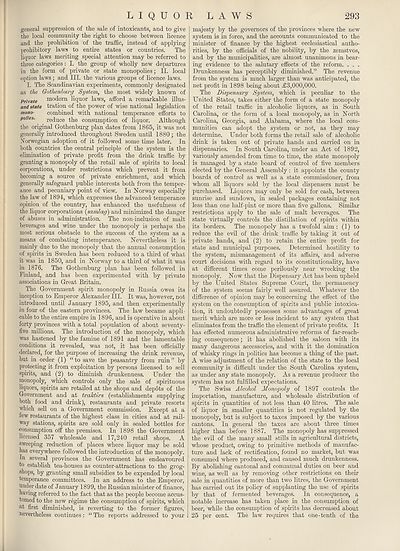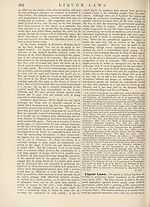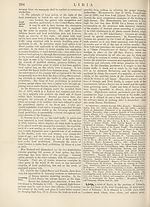New volumes of the Encyclopædia Britannica > Volume 30, K-MOR
(323) Page 293
Download files
Complete book:
Individual page:
Thumbnail gallery: Grid view | List view

293
LIQUOR LAWS
general suppression of the sale of intoxicants, and to give
the local community the right to choose between licence
and the prohibition of the traffic, instead of applying
prohibitory laws to entire states or countries. The
liquor laws meriting special attention may be referred to
three categories: I. the group of wholly new departures
in the form of private or state monopolies; II. local
option laws; and III. the various groups of licence laws.
I. The Scandinavian experiments, commonly designated
as the Gothenburg System, the most widely known of
Private modern liquor laws, afford a remarkable illus-
and state tration of the power of wise national legislation
mono- combined with national temperance efforts to
pohes. reduce the consumption of liquor. Although
the original Gothenburg plan dates from 1865, it was not
generally introduced throughout Sweden until 1880; the
Norwegian adoption of it followed some time later. In
both countries the central principle of the system is the
elimination of private profit from the drink traffic by
granting a monopoly of the retail sale of spirits to local
corporations, under restrictions which prevent it from
becoming a source of private enrichment, and which
generally safeguard public interests both from the temper¬
ance and pecuniary point of view. In Norway especially
the law of 1894, which expresses the advanced temperance
opinion of the country, has enhanced the usefulness of
the liquor corporations (samlag) and minimized the danger
of abuses in administration. The non-inclusion of malt
beverages and wine under the monopoly is perhaps the
most serious obstacle to the success of the system as a
means of combating intemperance. Nevertheless it is
mainly due to the monopoly that the annual consumption
of spirits in Sweden has been reduced to a third of what
it was in 1850, and in Norway to a third of what it was
in 1876. The Gothenburg plan has been followed in
Finland, and has been experimented with by private
associations in Great Britain.
The Government spirit monopoly in Bussia owes its
inception to Emperor Alexander III. It was, however, not
introduced until January 1895, and then experimentally
in four of the eastern provinces. The law became appli¬
cable to the entire empire in 1896, and is operative in about
forty provinces with a total population of about seventy-
five millions. The introduction of the monopoly, which
was hastened by the famine of 1891 and the lamentable
conditions it revealed, was not, it has been officially
declared, for the purpose of increasing the drink revenue,
but in order (1) “to save the peasantry from ruin” by
protecting it from exploitation by persons licensed to sell
spirits, and (2) to diminish drunkenness. Under the
monopoly, which controls only the sale of spirituous
liquors, spirits are retailed at the shops and depots of the
Government and at traktirs (establishments supplying
both food and drink), restaurants and private resorts
which sell on a Government commission. Except at a
few restaurants of the highest class in cities and at rail¬
way stations, spirits are sold only in sealed bottles for
consumption off the premises. In 1898 the Government
licensed 357 wholesale and 17,240 retail shops. A
sweeping reduction of places where liquor may be sold
has everywhere followed the introduction of the monopoly.
In several provinces the Government has endeavoured
4o establish tea-houses as counter-attractions to the grog¬
shops, by granting small subsidies to be expended by local
temperance committees. In an address to the Emperor,
under date of January 1899, the Russian minister of finance,
having referred to the fact that as the people become accus¬
tomed to the new regime the consumption of spirits, which
at first diminished, is reverting to the former figures,
nevertheless continues: “ The reports addressed to your
majesty by the governors of the provinces where the new
system is in force, and the accounts communicated to the
minister of finance by the highest ecclesiastical autho¬
rities, by the officials of the nobility, by the zemstvos,
and by the municipalities, are almost unanimous in bear¬
ing evidence to the salutary effects of the reform. . . .
Drunkenness has perceptibly diminished.” The revenue
from the system is much larger than was anticipated, the
net profit in 1898 being about <£3,000,000.
The Dispensary System, which is peculiar to the
United States, takes either the form of a state monopoly
of the retail traffic in alcoholic liquors, as in South
Carolina, or the form of a local monopoly, as in North
Carolina, Georgia, and Alabama, where the local com¬
munities can adopt the system or not, as they may
determine. Under both forms the retail sale of alcoholic
drink is taken out of private hands and carried on in
dispensaries. In South Carolina, under an Act of 1892,
variously amended from time to time, the state monopoly
is managed by a state board of control of five members
elected by the General Assembly : it appoints the county
boards of control as well as a state commissioner, from
whom all liquors sold by the local dispensers must be
purchased. Liquors may only be sold for cash, between
sunrise and sundown, in sealed packages containing not
less than one half-pint or more than five gallons. Similar
restrictions apply to the sale of malt beverages. The
state virtually controls the distillation of spirits within
its borders. The monopoly has a twofold aim : (1) to
reduce the evil of the drink traffic by taking it out of
private hands, and (2) to retain the entire profit for
state and municipal purposes. Determined hostility to
the system, mismanagement of its affairs, and adverse
court decisions with regard to its constitutionality, have
at different times come perilously near wrecking the
monopoly. Now that the Dispensary Act has been upheld
by the United States Supreme Court, the permanency
of the system seems fairly well assured. Whatever the
difference of opinion may be concerning the effect of the
system on the consumption of spirits and public intoxica¬
tion, it undoubtedly possesses some advantages of great
merit which are more or less incident to any system that
eliminates from the traffic the element of private profits. It
has effected numerous administrative reforms of far-reach¬
ing consequence; it has abolished the saloon with its
many dangerous accessories, and with it the domination
of whisky rings in politics has become a thing of the past.
A wise adjustment of the relation of the state to the local
community is difficult under the South Carolina system,
as under any state monopoly. As a revenue producer the
system has not fulfilled expectations.
The Swiss Alcohol Monopoly of 1897 controls the
importation, manufacture, and wholesale distribution of
spirits in quantities of not less than 40 litres. The sale
of liquor in smaller quantities is not regulated by the
monopoly, but is subject to taxes imposed by the various
cantons. In general the taxes are about three times
higher than before 1887. The monopoly has suppressed
the evil of the many small stills in agricultural districts,
whose product, owing to primitive methods of manufac¬
ture and lack of rectification, found no market, but was
consumed where produced, and caused much drunkenness.
By abolishing cantonal and communal duties on beer and
wine, as well as by removing other restrictions on their
sale in quantities of more than two litres, the Government
has carried out its policy of supplanting the use of spirits
by that of fermented beverages. In consequence, a
notable increase has taken place in the consumption of
beer, while the consumption of spirits has decreased about
25 per cent. The law requires that one-tenth of the
LIQUOR LAWS
general suppression of the sale of intoxicants, and to give
the local community the right to choose between licence
and the prohibition of the traffic, instead of applying
prohibitory laws to entire states or countries. The
liquor laws meriting special attention may be referred to
three categories: I. the group of wholly new departures
in the form of private or state monopolies; II. local
option laws; and III. the various groups of licence laws.
I. The Scandinavian experiments, commonly designated
as the Gothenburg System, the most widely known of
Private modern liquor laws, afford a remarkable illus-
and state tration of the power of wise national legislation
mono- combined with national temperance efforts to
pohes. reduce the consumption of liquor. Although
the original Gothenburg plan dates from 1865, it was not
generally introduced throughout Sweden until 1880; the
Norwegian adoption of it followed some time later. In
both countries the central principle of the system is the
elimination of private profit from the drink traffic by
granting a monopoly of the retail sale of spirits to local
corporations, under restrictions which prevent it from
becoming a source of private enrichment, and which
generally safeguard public interests both from the temper¬
ance and pecuniary point of view. In Norway especially
the law of 1894, which expresses the advanced temperance
opinion of the country, has enhanced the usefulness of
the liquor corporations (samlag) and minimized the danger
of abuses in administration. The non-inclusion of malt
beverages and wine under the monopoly is perhaps the
most serious obstacle to the success of the system as a
means of combating intemperance. Nevertheless it is
mainly due to the monopoly that the annual consumption
of spirits in Sweden has been reduced to a third of what
it was in 1850, and in Norway to a third of what it was
in 1876. The Gothenburg plan has been followed in
Finland, and has been experimented with by private
associations in Great Britain.
The Government spirit monopoly in Bussia owes its
inception to Emperor Alexander III. It was, however, not
introduced until January 1895, and then experimentally
in four of the eastern provinces. The law became appli¬
cable to the entire empire in 1896, and is operative in about
forty provinces with a total population of about seventy-
five millions. The introduction of the monopoly, which
was hastened by the famine of 1891 and the lamentable
conditions it revealed, was not, it has been officially
declared, for the purpose of increasing the drink revenue,
but in order (1) “to save the peasantry from ruin” by
protecting it from exploitation by persons licensed to sell
spirits, and (2) to diminish drunkenness. Under the
monopoly, which controls only the sale of spirituous
liquors, spirits are retailed at the shops and depots of the
Government and at traktirs (establishments supplying
both food and drink), restaurants and private resorts
which sell on a Government commission. Except at a
few restaurants of the highest class in cities and at rail¬
way stations, spirits are sold only in sealed bottles for
consumption off the premises. In 1898 the Government
licensed 357 wholesale and 17,240 retail shops. A
sweeping reduction of places where liquor may be sold
has everywhere followed the introduction of the monopoly.
In several provinces the Government has endeavoured
4o establish tea-houses as counter-attractions to the grog¬
shops, by granting small subsidies to be expended by local
temperance committees. In an address to the Emperor,
under date of January 1899, the Russian minister of finance,
having referred to the fact that as the people become accus¬
tomed to the new regime the consumption of spirits, which
at first diminished, is reverting to the former figures,
nevertheless continues: “ The reports addressed to your
majesty by the governors of the provinces where the new
system is in force, and the accounts communicated to the
minister of finance by the highest ecclesiastical autho¬
rities, by the officials of the nobility, by the zemstvos,
and by the municipalities, are almost unanimous in bear¬
ing evidence to the salutary effects of the reform. . . .
Drunkenness has perceptibly diminished.” The revenue
from the system is much larger than was anticipated, the
net profit in 1898 being about <£3,000,000.
The Dispensary System, which is peculiar to the
United States, takes either the form of a state monopoly
of the retail traffic in alcoholic liquors, as in South
Carolina, or the form of a local monopoly, as in North
Carolina, Georgia, and Alabama, where the local com¬
munities can adopt the system or not, as they may
determine. Under both forms the retail sale of alcoholic
drink is taken out of private hands and carried on in
dispensaries. In South Carolina, under an Act of 1892,
variously amended from time to time, the state monopoly
is managed by a state board of control of five members
elected by the General Assembly : it appoints the county
boards of control as well as a state commissioner, from
whom all liquors sold by the local dispensers must be
purchased. Liquors may only be sold for cash, between
sunrise and sundown, in sealed packages containing not
less than one half-pint or more than five gallons. Similar
restrictions apply to the sale of malt beverages. The
state virtually controls the distillation of spirits within
its borders. The monopoly has a twofold aim : (1) to
reduce the evil of the drink traffic by taking it out of
private hands, and (2) to retain the entire profit for
state and municipal purposes. Determined hostility to
the system, mismanagement of its affairs, and adverse
court decisions with regard to its constitutionality, have
at different times come perilously near wrecking the
monopoly. Now that the Dispensary Act has been upheld
by the United States Supreme Court, the permanency
of the system seems fairly well assured. Whatever the
difference of opinion may be concerning the effect of the
system on the consumption of spirits and public intoxica¬
tion, it undoubtedly possesses some advantages of great
merit which are more or less incident to any system that
eliminates from the traffic the element of private profits. It
has effected numerous administrative reforms of far-reach¬
ing consequence; it has abolished the saloon with its
many dangerous accessories, and with it the domination
of whisky rings in politics has become a thing of the past.
A wise adjustment of the relation of the state to the local
community is difficult under the South Carolina system,
as under any state monopoly. As a revenue producer the
system has not fulfilled expectations.
The Swiss Alcohol Monopoly of 1897 controls the
importation, manufacture, and wholesale distribution of
spirits in quantities of not less than 40 litres. The sale
of liquor in smaller quantities is not regulated by the
monopoly, but is subject to taxes imposed by the various
cantons. In general the taxes are about three times
higher than before 1887. The monopoly has suppressed
the evil of the many small stills in agricultural districts,
whose product, owing to primitive methods of manufac¬
ture and lack of rectification, found no market, but was
consumed where produced, and caused much drunkenness.
By abolishing cantonal and communal duties on beer and
wine, as well as by removing other restrictions on their
sale in quantities of more than two litres, the Government
has carried out its policy of supplanting the use of spirits
by that of fermented beverages. In consequence, a
notable increase has taken place in the consumption of
beer, while the consumption of spirits has decreased about
25 per cent. The law requires that one-tenth of the
Set display mode to:
![]() Universal Viewer |
Universal Viewer | ![]() Mirador |
Large image | Transcription
Mirador |
Large image | Transcription
Images and transcriptions on this page, including medium image downloads, may be used under the Creative Commons Attribution 4.0 International Licence unless otherwise stated. ![]()
| Encyclopaedia Britannica > New volumes of the Encyclopædia Britannica > Volume 30, K-MOR > (323) Page 293 |
|---|
| Permanent URL | https://digital.nls.uk/193571700 |
|---|
| Attribution and copyright: |
|
|---|---|
| Shelfmark | EB.18 |
|---|---|
| Description | Ten editions of 'Encyclopaedia Britannica', issued from 1768-1903, in 231 volumes. Originally issued in 100 weekly parts (3 volumes) between 1768 and 1771 by publishers: Colin Macfarquhar and Andrew Bell (Edinburgh); editor: William Smellie: engraver: Andrew Bell. Expanded editions in the 19th century featured more volumes and contributions from leading experts in their fields. Managed and published in Edinburgh up to the 9th edition (25 volumes, from 1875-1889); the 10th edition (1902-1903) re-issued the 9th edition, with 11 supplementary volumes. |
|---|---|
| Additional NLS resources: |
|

